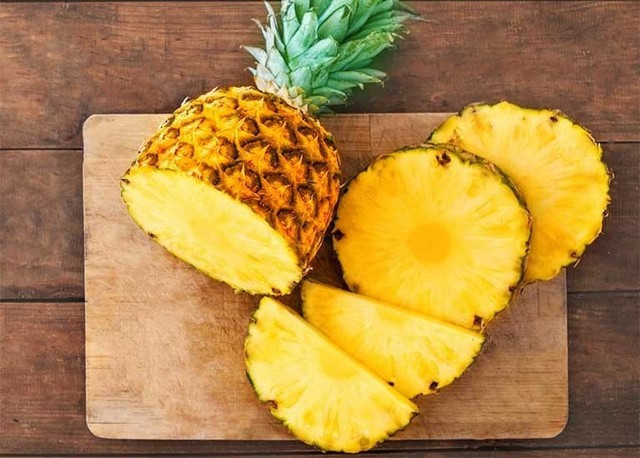Why does eating pineapple help digestion?
Not only rich in vitamins and minerals, pineapple also contains a special enzyme. What is the effect of this enzyme? Why should you eat pineapple when you have bloating and indigestion?
1. Health benefits of eating pineapple
Pineapple is a sweet and fragrant summer fruit with high nutritional value, especially vitamins and minerals such as: vitamin A, B6, C, K, manganese, thiamine, choline, calcium, phosphorus, zinc...
In terms of nutritional composition, a cup of pineapple (about 165g) contains approximately:
82.5 calories 21.6g carbohydrate 0.9g protein 2.3g fiber 0.2g fat 78.9mg vitamin C 0.2mg vitamin B6 29.7 micrograms folate 19.8mg magnesium 180mg potassium 0.1mg thiamine 0.2mg copper 1.5mg manganese
The high vitamin C content in pineapples helps maintain healthy connective tissues and boosts the body’s immune system. Pineapple juice is also an excellent source of beta-carotene and vitamin A. These antioxidants promote healthy skin, help heal wounds, and help prevent premature aging of the skin.

2. How does pineapple aid digestion?
Not only rich in vitamins and minerals, pineapple also contains a special enzyme that is beneficial for digestive health, which is bromelain. Bromelain is an enzyme that has been used for centuries to treat a variety of diseases. Historically, indigenous people in Central and South America used pineapple to treat diseases such as digestive disorders. Modern research has also studied the effects of bromelain in pineapple on human health.
According to the National Institutes of Health, bromelain is an enzyme called a proteolytic enzyme. It is found in pineapple juice and in the pineapple stem.
Bromelain causes the body to produce substances that fight pain and inflammation. Bromelain also contains chemicals that seem to interfere with tumor cells and slow blood clotting. People use bromelain to treat muscle aches, burns, kidney stones, and a number of other health conditions.
Because the enzyme bromelain in pineapple helps break down proteins in the intestines, it can help relieve constipation, bloating, and indigestion. Bromelain also has antibacterial properties that help protect the intestines from diarrhea-causing bacteria like E. coli and reduce intestinal inflammation.
Additionally, bromelain helps break down tough meat proteins, which is why it is often used as a meat tenderizer in commercial products.
When cooking, many people often combine pineapple with meat, or marinate pineapple with meat before cooking, which will make the meat softer, more delicious and easier to digest. Eating pineapple for dessert after a meal also brings a pleasant feeling of digestion.

3. How to eat pineapple safely and well for digestion
You should eat ripe pineapple, choose fresh, intact fruit, peel off the skin and eyes. Do not eat too much or drink too much pineapple juice to avoid consuming too much sugar. Just drink a glass of pineapple juice a day is enough and do not add sugar.
It should be noted that in addition to allergic reactions, bromelain can cause gastrointestinal side effects in some people, such as diarrhea and stomach pain. These side effects are due to food intolerance, not food allergies.
Some side effects of bromelain have been reported in studies. The most commonly reported side effects are stomach upset and diarrhea. Allergic reactions may occur in people who are sensitive or allergic to pineapple or who have other allergies. Additionally, bromelain may interact with certain medications, such as the antibiotic amoxicillin.
Do not eat pineapple when hungry because the organic acids of pineapple and bromelain strongly affect the stomach and intestines, causing nausea and discomfort.
For people with stomach problems, consuming too much pineapple can cause nausea, diarrhea or heartburn. The acidity of pineapple can also increase heartburn symptoms in people with gastroesophageal reflux disease.


